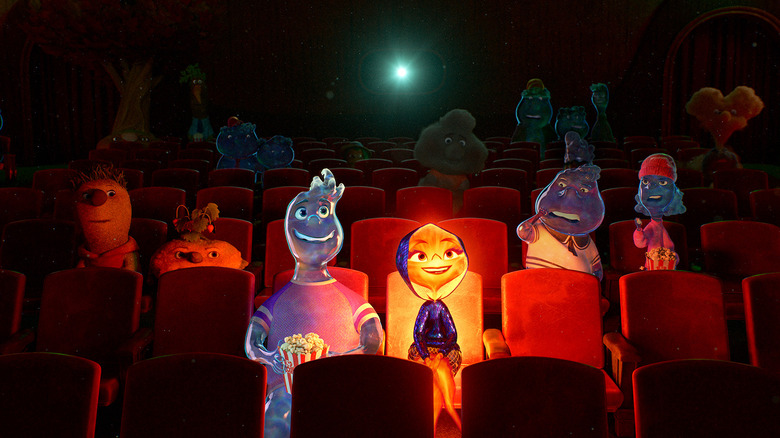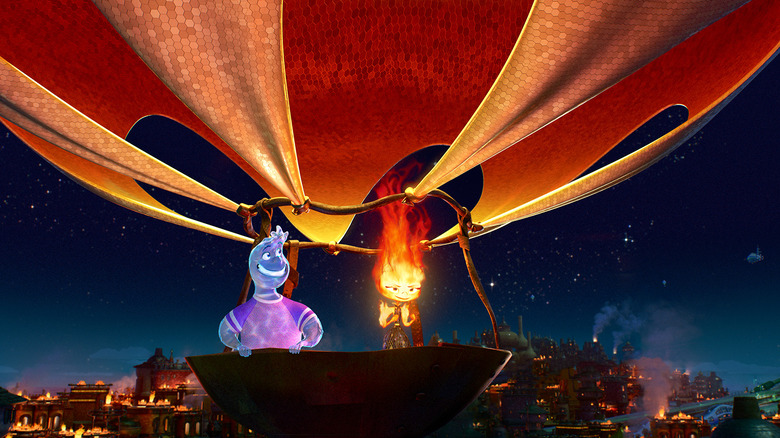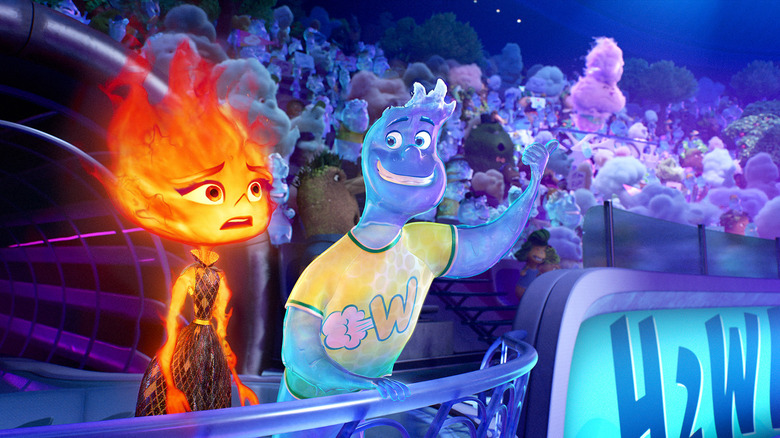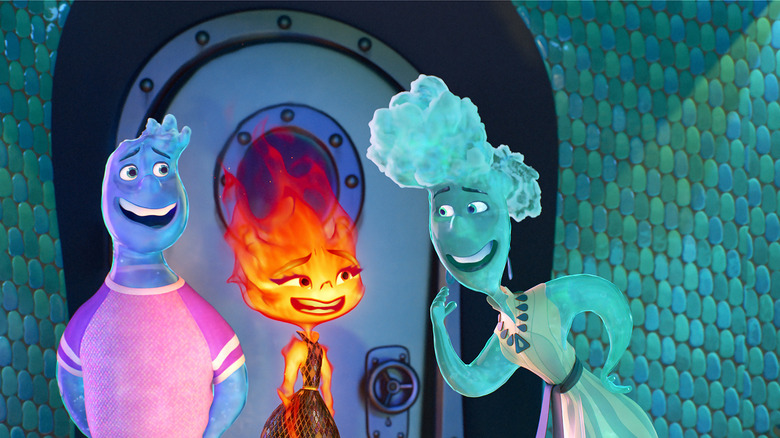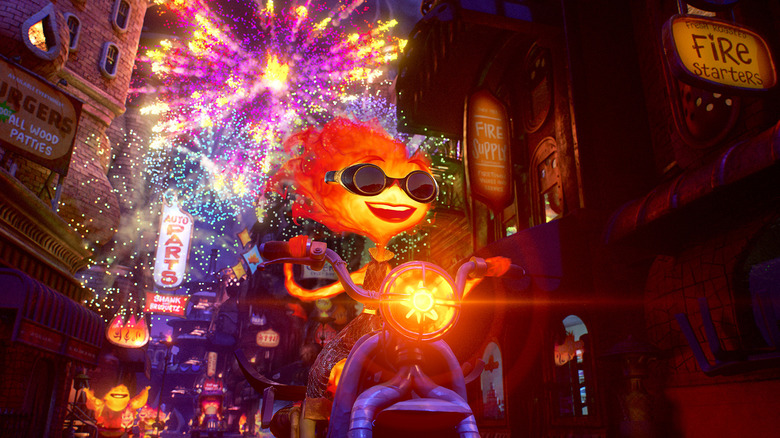Pixar's Elemental Stars Get Candid About The Importance Of Immigrant Stories [Exclusive Interview]
At a certain point in many of our lives, we come to a crossroads where we choose to forge our own path or continue on the road our parental figures have carved out for us. If you've been there, you know how difficult it can be to juggle the pressures we put on ourselves to appease our parents so their sacrifices don't feel like they were for nothing, often at the expense of our own happiness and passions. This conflict is at the heart of Pixar's latest feature, "Elemental," a romantic comedy doubling as a deeply personal tale of immigrant families. The film centers on a fire woman named Ember (Leah Lewis) and a water man named Wade (Mamoudou Athie) whose lives are immediately complicated by their newfound relationship in the world of Element City, where folks traditionally stick to their own elemental type.
It took seven years for director Peter Sohn to bring "Elemental" to life, and the final product is well worth the wait. It is this writer's opinion that "Elemental" is one of the strongest films in the Pixar canon, and that Ember and Wade are two stand-out characters that fans will surely fall in love with as the pair fell in love with one another. Ahead of the film's arrival in theaters, I was able to speak with Lewis and Athie about what it was like to work on the film and learn just how much of their own lived experiences were utilized to tell Ember and Wade's story. What follows is a touching interview that made me just as misty-eyed in the room as the film made me in the theater. These two are such phenomenal talents and human beings that you won't be able to resist becoming their biggest fan.
Note: This interview has been lightly edited for clarity and brevity.
'It's something so special'
The first movie I ever saw in theaters was "Toy Story" when I was five years old, and it introduced me to the magic of the movies. "Elemental" is absolutely going to be somebody's first movie and going to spark their love of movies and the magic of storytelling. Has it hit you yet that you're both about to be a part of that for so many people?
Lewis: I think it has. It keeps hitting me over and over again, but I think just being an initial fan of Pixar, even before getting to be attached to this film, I saw what Pixar has done for me and what these kinds of films and Disney animation have done for me. I don't think any of us have taken it lightly that we're going to be a part of someone's first experience or getting to teach them some of the amazing lessons about love that we have in this film. I think it's something so special, and I'm just so proud that we even get to do that.
Beautiful.
Athie: Yeah. My goddaughters are going. This will be their first movie in the theater.
Oh my god!
Athie: So I'm going to have to leave them a voice memo or voice note as Wade afterward. I really can't wait. I really can't wait.
'I'm really hopeful about the future'
Something I loved so much about this story is these characters are also showing these specifically big emotions that we have a tendency to socialize people to not explore. Especially with Wade. He wears all of his feelings on his sleeve, he's not afraid to cry, and that is, unfortunately, a lot of kids are told, "Oh, man up, don't cry." Did that influence your performance, knowing that you're playing a character that we don't see very often?
Athie: I am so thrilled that I got to do this. I remember growing up and feeling very shy about how emotional I normally am. And obviously, I got over it with the help of friends and school and just growing up and becoming more comfortable with myself. But I'd love to see more kids [do that]. If I think back [to] a time, and I think about how kids in my neighborhood felt similarly ashamed or, "Oh, it's not a manly way to be." Getting to play a part like this in a movie like this that is so full of love and open-heartedness, I'm really hopeful about the future.
The same thing goes with Ember. She's got this very justified anger and rage that she doesn't really know what to do with. And a lot of times I think we stifle young girls and say, "Be nice, be pretty, be soft, be quiet." How did you bring that approach to the character?
Lewis: One thousand percent. These are all so amazing points that you're bringing out. It's interesting because you would think, "Okay, Ember is angry, Ember is this and that," but the only person to question this, who begged her to dig deeper, was Wade, in being like, "Maybe your temper is trying to tell you something." And I think it's really amazing that this movie can encourage children at a younger age to dig deeper. It's not just about anger or sadness or whatever the large emotions are. It could be something that is tailored to you, and maybe Ember's not angry, maybe Ember is fearful. Maybe she wants to find her place in the world and maybe she's actually yearning for something much bigger. But a lot of those questions aren't really asked to, yes, young women who are angry — or not even angry, just strong and very assured with themselves, because Ember is very clear about the ground rules in her life very early on in the film, as we see.
'Every time we went to the booth, I'd want to call my family'
Definitely. I think a lot of times anger is shown as almost a defense mechanism because we don't want to show that we're feeling vulnerable or that we're nervous or scared, so we project anger because then at least people back away and they don't dig deeper. We've been talking a little bit about children, and obviously, this is a movie that will appeal to children, but it will absolutely appeal to adults. I am a big crier. I was openly weeping toward the end of this movie.
Lewis: Oh yes, the weep!
Pixar, you've done it again! I want to talk about the more adult themes like the pressure I think so many of us have once we get to a certain age and we're supposed to go out on our own and be adults, but you still have mom and dad or whatever parental combination you have in the back of your head wanting you to do something. Was any self-reflection of your own relationship with the generational or familial bonds that you have in your life something you had to work through while making this movie?
Lewis: That is such a big question.
Athie: Yeah. Making this movie, I've been telling people, it just made me ... every time we went to the booth, I'd want to call my family. My family came here when I was a baby. I was about five months old and my dad was a diplomat in my home country of Mauritania and had to start all over again because we had to escape, and just the sacrifice that is. And my mom leaving family behind, never seeing them for years and decades, decades, unless they're talking on the phone. And just rebuilding a life in the States; a culture shock. All this just for the sake of their kids having a better life, a safe life.
It is a debt that isn't ... it's actually not a debt, I've been saying that a lot. It's not really a debt, it's just something that you feel is a debt. But my parents won't look at it as that. They're like, "Yeah, this is what we're supposed to do. You're our kids. Of course, we did this." But the feeling growing up was like, "Oh man, I got to take care of them when I'm old. I got to do this, I got to do that." Well, anyway, to have them at the premiere like we did [on] Thursday and then the texts and the calls and everything that they've said afterward just made it feel like, "Ah, this is our work together." And that's how I feel about this movie. It's everyone's work. It's not just Pete [Sohn], it's Pete's parents who put so much into it, and so much into him. And all of us, all of us have made this beautiful, beautiful project all together and with our families.
'They wanted me to love myself'
Leah, do you have anything you'd like to add to that?
Lewis: I do have a lot to add. I have a similar but different story, but my parents adopted me from Shanghai, China when I was six months old. And they did the same for my sister. And from a very early age, I knew that I wanted to be a part of acting and singing, or when I was a kid, just drama, the arts, and theater in general. And they really, really took a chance on me because usually when kids say stuff like that, parents are like, "Okay, we'll wait till you grow up and actually figure out what that means." But they saw that joy very, very early on in me, and they did everything they could possible with their lives — my sister's life as well, she gave everything she could to help me go out and achieve this.
I do think whether they had helped me with my dreams or not, the debt of gratitude that Mamoudou talks about when you really see your parents for people and all the things they put forward for you, there's so many expectations that I think parents can already put on their children, but the expectation that you put on yourself is really, really large. And I think I definitely put that on my shoulders only to find out that in the end, my parents just wanted me to be happy, and they wanted me to love them too, which I always have. And they wanted me to love myself.
Any kind of specific quality or dream they might have had for me really just manifest in my parents looking at me today and even sitting next to me at the premiere and being like, "I'm so happy that you're happy and that you're healthy and you're okay." And that is full circle, all of it. Telling this story and also knowing how close it is to Peter and to Mamoudou and all the other people who have those ties with their family or chosen family charge on. I'm so happy to be here.
"Elemental" arrives in theaters on June 16, 2023.
